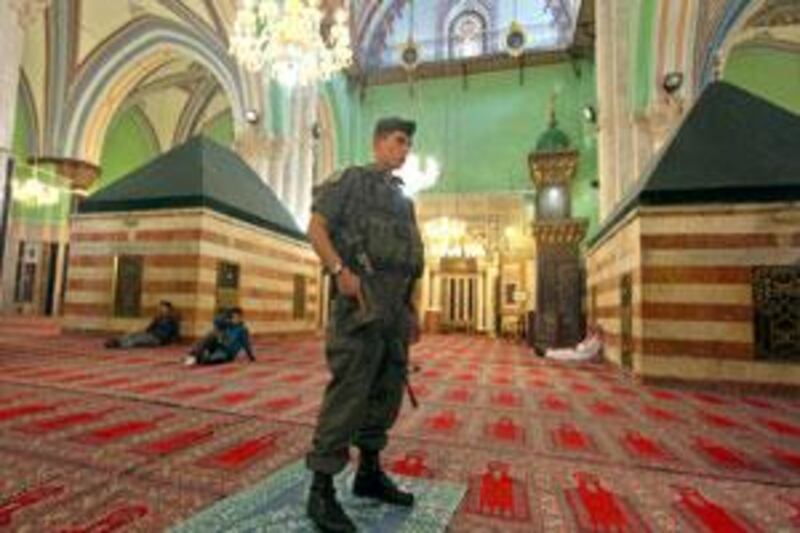JERUSALEM // The Israeli decision to include religious sites in the West Bank on a list of "national heritage sites" has caused a war of words between Palestinians and Israelis that is threatening to further undermine already faltering efforts to restart peace talks.
On Sunday, Benjamin Netanyahu, the Israeli prime minister, announced that he, at the behest of the religious Shas Party, one of Mr Netanyahu's coalition partners, had included the Ibrahimi mosque in Hebron as well as the Bilal Ibn Ribah mosque/Rachel's Tomb outside Bethlehem on a list of Israeli heritage sites up for restoration. Israel has full military control over the areas of the sites, both in occupied territory, but the decision was seen by Palestinians across the political spectrum as an effort to lay permanent claim to part of occupied territory also of great religious significance to Muslims. On Tuesday, Mahmoud Abbas, the PLO leader and president of the Palestinian Authority, warned that the decision would only exacerbate tensions and could lead to renewed conflict.
The Ibrahimi mosque, identified as the site of the tomb of Ibrahim (Abraham in the Jewish/Christian tradition), has been a particular flashpoint for violence over the years mainly due to the presence of some 400 far-right Jewish settlers in the centre of the city. In 1994, one such settler, Baruch Goldstein, an Israeli army doctor, entered the mosque with a machine gun and killed 29 Palestinians at prayer.
Monday and Tuesday both witnessed mass protests in the city, with Palestinians burning tyres and throwing rocks at Israeli soldiers enforcing the division of the centre of the city between Jews and non-Jews. In Bethlehem, severed by Israel's separation barrier from the Bilal Ibn Ribah mosque/Rachel's Tomb, Palestinians called a three-day strike. While it is unlikely that the decision will lead to the third intifada called for by Ismail Haniyeh, Hamas's prime minister in the Gaza Strip, on Tuesday, it will do nothing for US-led efforts to restart peace talks.
Palestinians are insisting that Israel needs to halt all settlement construction in occupied territory before peace talks start as a sign that the Israeli government is serious about reaching a negotiated agreement to end the occupation. To begin restoration of religious sites in occupied territory that settlers in Israel claim as exclusively Jewish will simply be seen as an extension of a programme of settling the West Bank to the exclusion of Palestinians.
"The issue is not whether these sites are Islamic or Jewish," said Ghassan Khatib, head of the Palestinian government's media office. "The point is that these are historic sites in occupied territory and Israel has no business controlling them." Israeli officials have accused the Palestinians of hypocrisy in their response to Mr Netanyahu's decision. A statement from the Israeli prime minister's office on Tuesday said Mr Abbas and the PA were engaged in a "mendacious and hypocritical campaign. The State of Israel is committed to freedom of religion for worshippers of all faiths at the holy places and thus it acts in practice".
Yossi Alpher, an Israeli analyst based in Tel Aviv, said the Israeli government should have foreseen that "in the present atmosphere", there would be a strong reaction to the decision. Nevertheless, he said, the reaction was "exaggerated". "Given that the decision was simply a political gesture and part of coalition politics, this is not a deal-breaker," Mr Alpher said. "That they [the religious sites] have been added to a list doesn't mean they can't be part of negotiations. It seems to me the Palestinians are using the decision as another excuse not to return to negotiations."
Such reasoning, however, can be applied to both sides. Yesterday, Yasser Abed Rabbo, a senior PLO official, said Mr Netanyahu's decision was a "deliberate poisoning of the atmosphere by an extreme right wing government that does not want peace or serious negotiations". Beneath the political furore, however, the decision also reopens some of the more fundamental fault-lines of the Palestinian-Israeli conflict, in which history is often used to legitimise present-day policy. This is particularly true on the Israeli side where Jewish history lies at the heart of Zionist claims to a land in which there was hardly any Jewish presence before the Zionist movement, and has been an important element in forging both international support for Israel and a domestic founding narrative.
That much was clear in the response by the Jewish Orthodox Union, which commended Mr Netanyahu for his decision. "While some continue to wage a campaign to deny and obscure the historic connection of the Jewish people to the land of Israel - and have even permitted Jewish sites to be defaced - that connection is deep and ancient," said a statement from OU President Stephen Savitsky and Executive Vice President Rabbi Steve Weil. "Nowhere is that Jewish connection more obvious than these two biblical sites."
It is for these reasons that some Palestinians are very concerned about the decision to include the sites on a list of Israeli heritage sites. "The two sites, which have deep historical, religious and cultural significance for the Palestinian people, are being threatened with a deliberate Israeli attempt to forge history and ultimately manipulate it to make geopolitical claims," Hanan Ashrawi, member of the PLO's executive committee, said in a statement Monday.
"Palestinians will not allow Israel to recreate a fraudulent reality in Palestine where Palestinian history, culture, and identity are distorted and/or obliterated by the force of occupation." @Email:okarmi@thenational.ae





